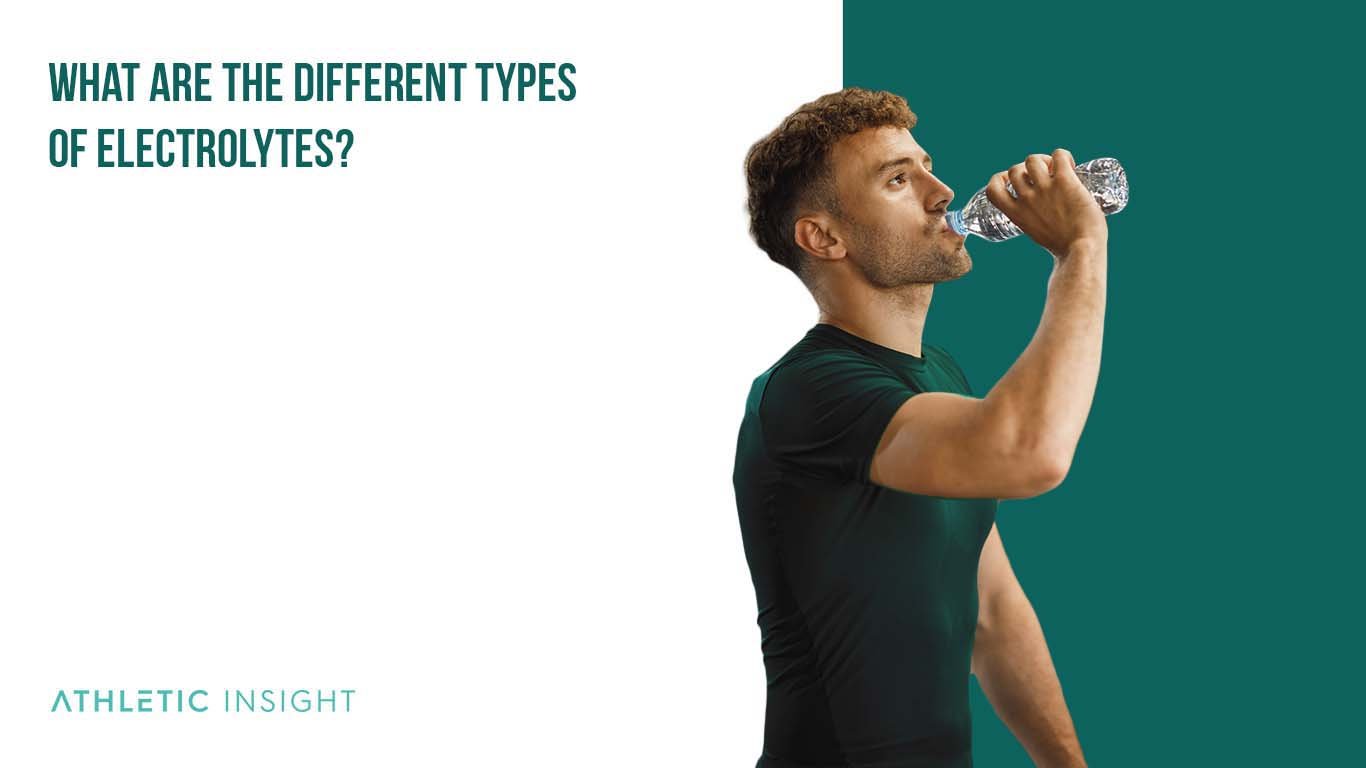Electrolytes are vital elements within the human body that are essential for physiological functions. These electrolytes can be consumed naturally through an adequate diet or supplemented through the use of electrolyte tablets, which are often dissolved in water.
These vital elements help with maintaining fluid balance and preventing dehydration, supporting proper muscle function and preventing cramps, regulating nerve function and cellular communication, ensuring the optimal function of vital organs, and assisting in nutrient absorption and transportation.
In this comprehensive guide, the purpose of electrolytes will be discussed, as well as the different types of electrolytes, and their impact on the human body and athletic performance.
What Exactly is an Electrolyte?
An electrolyte is a substance that, when dissolved in a solution, generates ions capable of conducting electricity. These charged particles play a crucial role in numerous biological processes, such as maintaining fluid balance, regulating nerve and muscle function, and ensuring the proper functioning of vital organs. Electrolytes are indispensable for maintaining homeostasis, and their optimal levels are paramount for overall health and well-being.

What is the Purpose of Electrolytes?
Electrolytes serve several indispensable functions within the human body. They are responsible for transmitting electrical signals, which facilitate communication between cells and regulate essential processes like muscle contractions and nerve impulses. Furthermore, electrolytes maintain fluid balance and assist with nutrient absorption, ensuring that cells receive adequate sustenance for optimal function.
Why are Electrolytes Important in Our Body?
Electrolytes are vital for sustaining life, as they facilitate the seamless functioning of the body’s physiological processes. They play a significant role in maintaining fluid balance, ensuring proper hydration, and supporting the function of vital organs. They also contribute to the optimal performance of muscles and nerves, thus maintaining overall health and well-being.
What Are the Different Types of Electrolytes?
There are several types of electrolytes, each with unique roles in maintaining the body’s homeostasis. These include magnesium, potassium, calcium, sodium, phosphate, and chloride.
- Magnesium
- Potassium
- Calcium
- Sodium
- Phosphate
- Chloride

1. Magnesium
Magnesium is a critical electrolyte mineral that plays an essential role in various biochemical processes, including energy production, protein synthesis, and cellular communication. Thie magnesium supports muscle and nerve function and is involved in maintaining a steady heart rhythm. Magnesium can be obtained through dietary sources such as leafy greens, nuts, seeds, and whole grains or through supplements like magnesium citrate and magnesium glycinate.
2. Potassium
Potassium is another vital electrolyte mineral responsible for regulating fluid balance, nerve function, and muscle contractions. It plays a significant role in maintaining proper blood pressure and heart health. Rich dietary sources of potassium include bananas, avocados, potatoes, and legumes. Potassium supplements, such as potassium chloride or potassium citrate, are also available to support optimal levels.
3. Calcium
Calcium is a multifaceted electrolyte mineral with diverse functions, such as supporting bone health, facilitating muscle contractions, and assisting with blood clotting. It plays a crucial role in cell signaling and enzymatic processes. Calcium-rich foods include dairy products, dark leafy greens, and fortified plant-based milks. Supplements like calcium carbonate and calcium citrate are also available to support adequate intake.
4. Sodium
Sodium is an indispensable electrolyte that maintains fluid balance, supports nerve function, and regulates muscle contractions. Also, sodium is vital for proper blood pressure regulation and blood volume maintenance. Sodium is predominantly found in table salt, processed foods, and certain sports drinks. Sodium supplements are available but should be taken with caution due to potential health risks associated with excessive intake.
5. Phosphate
Phosphate is a key electrolyte involved in energy production, bone and teeth formation, and cellular membrane function. It plays a critical role in maintaining the body’s pH balance and supporting muscle contractions. Some Phosphates can be found in foods such as dairy products, whole grains, and lean meats. Phosphate supplements, like calcium phosphate or potassium phosphate, are available to support adequate intake.
6. Chloride
Chloride is an essential electrolyte that works closely with sodium to maintain fluid balance and support proper digestion. While chloride is often associated with hydration, it also contributes to the regulation of blood pH and the transport of nutrients across cell membranes. Chloride can be found in table salt, processed foods, and vegetables such as tomatoes and celery. Chloride supplements, like sodium chloride, can be utilized to maintain optimal levels.
How Important Are Electrolytes for Sports Athletes?
Electrolytes are crucial for sports athletes, as they enable the body to function optimally during physical exertion. They help maintain fluid balance, support muscle contractions, and prevent cramping, which can significantly impact an athlete’s performance.
What Are the Importance of Electrolytes for Sports?
Electrolytes are essential for athletes for several reasons, such as maintaining fluid balance to prevent dehydration, ensuring proper muscle function and preventing cramps, regulating nerve function for optimal communication between cells, supporting energy production for sustained performance, and assisting in nutrient absorption and transportation
- Maintaining fluid balance to prevent dehydration
- Ensuring proper muscle function and preventing cramps
- Regulating nerve function for optimal communication between cells
- Supporting energy production for sustained performance
- Assisting in nutrient absorption and transportation
How Can Electrolytes Improve Sports Athletes’ Performance?
Electrolytes can significantly enhance an athlete’s sports performance by maintaining optimal hydration, supporting efficient muscle function, and preventing cramps. Adequate electrolyte levels facilitate cellular communication, enabling the body to respond effectively to physical demands, ultimately leading to improved endurance and performance.
What are the Common Electrolytes Used by Athletes?
Athletes commonly use electrolytes such as sodium, potassium, and magnesium to support their performance. These minerals are crucial for maintaining fluid balance, supporting muscle function, and regulating nerve activity, all of which are essential for optimal athletic performance.
How Do Sports Athletes Replenish Electrolytes?
Athletes can replenish electrolytes through various methods, including consuming electrolyte-rich foods, drinking sports beverages, and taking supplements. It is crucial for athletes to monitor their electrolyte levels and adjust their intake accordingly to prevent imbalances that may negatively impact their performance.
What is the Best Way to Replenish Electrolytes?
The most effective way to replenish electrolytes is through a combination of consuming electrolyte-rich foods, staying hydrated, and, if necessary, using supplements or sports drinks. This approach ensures that the body maintains an optimal balance of electrolytes, promoting overall health and well-being.
How Can Electrolytes Replenish when On Diet?
When following a specific diet, it is crucial to incorporate electrolyte-rich foods and beverages to maintain optimal levels. Some diets may require additional supplementation to ensure that the body receives adequate electrolyte support. Consulting with a healthcare professional or registered dietitian can provide personalized guidance for maintaining electrolyte balance while adhering to a specific dietary regimen.
Do Electrolytes Deplete When Exercising?
Yes, electrolyte levels can deplete during exercise due to increased sweating, which leads to fluid and electrolyte loss. This depletion can impact an individual’s performance and overall health if not adequately replenished. It is crucial for athletes and those engaging in regular physical activity to monitor their electrolyte levels and adjust their intake to maintain optimal balance and performance.
What Can You Do to Prevent Electrolyte Levels from Dropping During Exercise?
To prevent electrolyte levels from dropping during exercise, consider the following strategies.
- Stay well-hydrated by consuming water and, if necessary, sports beverages containing electrolytes.
- Consume electrolyte-rich foods, such as fruits, vegetables, and dairy products, as part of a balanced diet.
- Monitor your electrolyte levels and adjust your intake as needed, particularly during periods of intense physical activity or in hot weather conditions.
- Consider supplementation with electrolyte minerals, such as magnesium, potassium, or sodium, under the guidance of a healthcare professional.
What Will Happen When You Have an Electrolyte Imbalance?
Electrolyte imbalances can lead to various health issues, including muscle weakness, cramping, irregular heartbeats, fatigue, and, in severe cases, seizures or loss of consciousness. The severity of symptoms depends on the degree of imbalance and the specific electrolyte involved. It is essential to address electrolyte imbalances promptly to avoid complications and maintain overall health.
What is the Effect of Electrolyte Imbalance on A Sports Athlete’s Performance?
An electrolyte imbalance can significantly impact an athlete’s performance by causing muscle cramps, fatigue, and irregular heartbeats. It may also lead to impaired cognitive function and reduced endurance, ultimately hindering their ability to perform at optimal levels.
What Are the Foods that Replenish Electrolytes?
Several foods can help replenish electrolytes, including leafy greens (magnesium), bananas (potassium), dairy products (calcium), salty snacks and pickles (sodium), lean meats and whole grains (phosphorus), and tomatoes and celery (chloride).
- Leafy greens, such as spinach and kale, for magnesium
- Bananas, avocados, and oranges for potassium
- Dairy products and fortified plant-based milks for calcium
- Salty snacks and pickles for sodium
- Lean meats and whole grains for phosphorus
- Tomatoes and celery for chloride
What Are the Drinks that Replenish Electrolytes?
Various drinks can help replenish electrolytes such as sports beverages that contain electrolytes, coconut water, electrolyte-enhanced water, and 100% fruit juice.

- Sports beverages containing sodium, potassium, and other electrolytes
- Coconut water, which is naturally high in potassium and magnesium
- Electrolyte-enhanced water or hydration tablets
- Fruit juices, such as orange or tomato juice, which contain potassium and other essential nutrients
What are the Health Benefits of Electrolytes?
Electrolytes offer numerous health benefits such as maintaining fluid balance and preventing dehydration, supporting proper muscle function and preventing cramps, regulating nerve function and cellular communication, ensuring the optimal function of vital organs, and assisting in nutrient absorption and transportation.
- Maintaining fluid balance and preventing dehydration
- Supporting proper muscle function and preventing cramps
- Regulating nerve function and cellular communication
- Ensuring the optimal function of vital organs
- Assisting in nutrient absorption and transportation
What are the Health Risks of Electrolytes?
Potential health risks associated with electrolytes are primarily related to imbalances, which can occur due to overconsumption or inadequate intake of specific electrolytes. Some health risks include hyperkalemia, hyponatremia, hypercalcemia, and hypomagnesemia.
- Hyperkalemia (elevated potassium levels), which can cause irregular heartbeats, muscle weakness, and, in severe cases, cardiac arrest
- Hyponatremia (low sodium levels), leading to symptoms such as headache, confusion, seizures, and, in extreme cases, coma
- Hypercalcemia (excessive calcium levels), resulting in kidney stones, bone pain, and digestive issues
- Hypomagnesemia (low magnesium levels), which can contribute to muscle cramps, fatigue, and irregular heartbeats
It is essential to monitor electrolyte levels and adjust intake as needed to maintain optimal balance and avoid these potential health risks.
Can Electrolytes Cause Heart Problems?
Yes, an imbalance in electrolyte levels, particularly potassium, sodium, and calcium, can contribute to heart problems. These electrolytes are critical for maintaining proper heart function, including regular heartbeats and muscle contractions. Imbalances can lead to arrhythmias, irregular heartbeats, and, in severe cases, cardiac arrest. It is crucial to maintain proper electrolyte balance to support heart health.
Do Electrolytes Hydrate You Faster than Water?
Yes, electrolytes can help hydrate the body more effectively than water alone, particularly during periods of intense physical activity or in hot weather conditions. Electrolytes, such as sodium and potassium, help the body retain fluids and maintain optimal hydration levels, which can be especially beneficial for athletes or those engaging in prolonged physical exertion.
Is It Ok to Drink Electrolytes Everyday?
It is generally safe to consume electrolytes daily, provided that intake is within the recommended guidelines and balanced with adequate water consumption. However, excessive intake of certain electrolytes, such as sodium, can lead to imbalances and potential health risks. It is essential to monitor electrolyte levels and adjust intake as needed to maintain optimal balance and overall health.
Are Electrolytes Just Salt?
No, electrolytes are not just salt. Although sodium, a component of table salt, is a critical electrolyte, other essential electrolytes include potassium, magnesium, calcium, phosphate, and chloride. Each of these electrolytes plays a unique role in maintaining overall health and supporting various bodily functions.
Are Electrolyte Supplements Safe?
Electrolyte supplements can be safe when used correctly and under the guidance of a healthcare professional. However, excessive or inappropriate use of supplements can lead to electrolyte imbalances and potential health risks. It is crucial to monitor electrolyte levels and adjust supplementation as needed to maintain optimal balance and support overall health.



